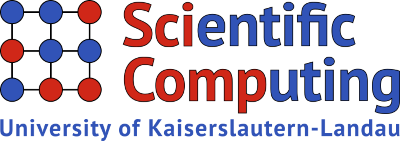Date and Place: Thursdays and hybrid (live in 32-349/online via Zoom). For detailed dates see below!
Content
In the Scientific Computing Seminar we host talks of guests and members of the SciComp team as well as students of mathematics, computer science and engineering. Everybody interested in the topics is welcome.
List of Talks
Event Information:
-
Thu25Jul2019
SC Seminar: Marc Schwalbach
11:30SC Seminar Room 32-349
Marc Schwalbach, von Karman Institute for Fluid Dynamics/TU Kaiserslautern
Title:
CAD-Based Adjoint Multidisciplinary Optimization Framework for Turbomachinery DesignAbstract:
Most adjoint-based optimization frameworks for turbomachinery only consider aerodynamic performance and constraints, leading to designs that need to pass through revisions by structural requirements. Only in recent years, adjoint optimization frameworks have been extended to include structural constraints.
In this work, a CAD-based parametrization is used for defining the shape freedom, from which the fluid and solid grids are generated. The aerodynamic efficiency is computed using a Reynolds-Averaged Navier-Stokes solver based on the finite volume method. The maximum von Mises stress and eigenfrequencies are computed using a linear stress and vibration solver based on the finite element method. The CFD, stress, and vibration solvers each have adjoint capabilities, allowing an efficient evaluation of the gradients at a cost independent of the size of the design space. The fluid and structural domains are coupled with the CAD kernel to form a CAD-based adjoint multidisciplinary optimization framework (MDO).
In this presentation, the CAD-based adjoint MDO framework is introduced. In particular, the differentiation of the FEM solver, using the AD tool CoDiPack, is discussed. This includes the differentiation of both the linear stress solver for the maximum von Mises stress gradients, which results in one additional linear system solve, and the vibration solver for eigenvalue gradients, which results in one additional outer product per eigenvalue. Performance results for gradient calculations are presented, as well as aerodynamic shape optimizations of a radial turbine with both maximum von Mises stress and vibrational resonance-reducing constraints.
